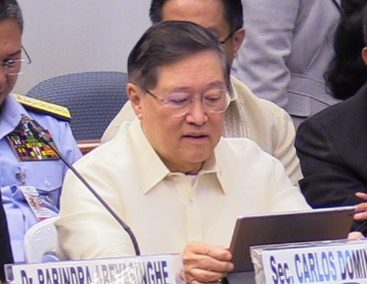
Finance Secretary Carlos Dominguez III attends Senate hearing on the outbreak of the 2019 Novel Coronavirus. CATHY MIRANDA / INQUIRER.net
MANILA, Philippines—The dismantling of the ban on open-pit mining has another supporter in no less than Finance Secretary Carlos Dominguez III, President Rodrigo Duterte’s chief economic manager and a former mining executive himself.
In a statement on Thursday (Dec. 30), Dominguez, who co-chairs the Cabinet-level, interagency Mining Industry Coordinating Council (MICC), assured that the government can “strictly regulate” the mining industry to minimize environmental damage.
Last week, the Department of Environment and Natural Resources (DENR) lifted the four-year prohibition on open-pit mining put in place by the former and late environment chief Gina Lopez.
“I support DENR Secretary Roy Cimatu’s decision to lift the ban on open-pit mining,” Dominguez said. “The matter was extensively discussed in the MICC and with advice and guidance from experts, the recommendation was to lift the ban,” he said.
Dominguez echoed officials of the DENR and the mining industry regulator Mines and Geosciences Bureau (MGB) in saying that Republic Act (RA) No. 7942, or the Philippine Mining Act of 1995, “does not prohibit open-pit mining as there are economic, safety, and environmental considerations for employing this method.”
“Adequate safeguards can be implemented to ensure the safety of this mining method,” said Dominguez,
“Strict monitoring and enforcement to ensure compliance with environmental standards shall be undertaken to prevent any abuse in the implementation of this type of mining activity,” the finance chief said.
Dominguez expressed confidence that the DENR was “fully capable of regulating mining operations in the country so that mining activities are conducted safely with due regard to the protection of the environment.”
Since he was designated by Duterte to chair the Climate Change Commission (CCC), Dominguez claimed he became “mindful of the impact of mining activities on the environment and the country’s goal to significantly reduce its carbon footprint.”
“The protection of the environment is non-negotiable. We have to strike a careful balance between preserving and protecting the environment and pursuing our economic development objectives,” he said.
As the Philippines emerges from the slump wrought by the prolonged COVID-19 pandemic, Dominguez earlier identified mining as a driver of economic recovery and a job creator.
Last year, Dominguez pushed for the “revival of the mining industry” as he claimed that the extractive sector would benefit rural areas where there were no alternative employment among locals who were used to mining jobs.
With no more ban on open-pit mining, Dominguez cited DENR estimates wherein 11 pending projects could be immediately started to generate 22,880 jobs in remote towns, raise P11 billion in annual tax and non-tax revenues for the government, plus jack up yearly mining exports by P36 billion.
“It will revive an industry that will create jobs and spur economic growth in the countryside,” said Dominguez.
“More importantly, the lifting of the ban on open-pit mining will help revitalize the economy as we begin to recover from the pandemic by generating additional revenues, royalty fees, export value, and even more jobs in related industries,” he said.
He added that “these economic prospects can still be realized while we continuously implement strategies to manage and avoid the negative impacts of the open-pit mining method.”
For Dominguez, “tight monitoring and enforcement to ensure that mines strictly comply with laws and regulations can be done as proven by the operations of thousands of mines worldwide that effectively and safely use the open-pit mining method.”
He pointed to open-pit mines in Australia, Canada, China, and the United States.
Dominguez had also identified the mining sector, through privatization of idle government-owned assets, as a revenue source to narrow the bigger, pandemic-induced budget deficit and repay ballooning debt.
Once legal issues were settled, the government plans to privatize mining assets like Basay Mining Corp.’s copper mines in Negros Oriental, potentially the first to be auctioned off.
The MGB had also disclosed plans to sell the assets of North Davao Mining Corp.’s mine in Davao del Norte, and Pacific Nickel Philippines Inc.’s in Surigao del Norte.
Last year, Dominguez ordered the Privatization and Management Office (PMO), an agency attached to the Department of Finance, to spearhead an interagency initiative to clear legal impediments—pending for several decades now—out of the way and quickly dispose of idle mining assets.
The PMO had identified government-held assets under litigation—like Maricalum Mining Corp.’s copper-gold project in Negros Occidental, and Nonoc Mining and Industrial Corp.’s nickel mines in Surigao del Norte—which the DOF last year described as “gold- and copper-rich”.
Also identified was Marinduque Mining and Industrial Corp.’s former nickel mine (MMIC Bagacay Mine) in Western Samar, which, like the Basay mine, had been “inoperational because of legal concerns on how these assets should be disposed.”
Also pending in Congress was DOF-backed legislation for a new mining fiscal regime, aimed at increasing public tax revenues and attracting more private investments.
TSB